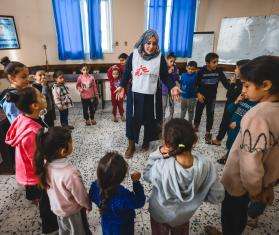Statement from MSF Director of Operations Brice de le Vingne.
“The WHO road map is welcome, but it should not give a false sense of hope. A plan needs to be acted upon. Huge questions remain about who will implement the elements in the plan. Who has the correct training for the variety of tasks that are detailed? How long will it take to train organizations to set up and run an Ebola management center? How long before any new centers become operational? Who will undertake the vitally important health education, contact tracing, and safe burials in the affected communities?
We have learned an uncomfortable lesson over the past six months: none of the organizations in the most affected countries—the UN, WHO, local governments, NGOs (including MSF)—currently have the proper set-up to respond at the scale necessary to make a serious impact on the spread of the outbreak. For some, the limits are due to capacity constraints—the simple inability to do more—and others may need to be encouraged to demonstrate more willingness to push the boundaries and scale up effective activities at a meaningful scale.
We cannot escape the need to rapidly and effectively contain this epidemic and provide the necessary care to patients, their families, and affected communities. As an international public health emergency, states with the capacity to help have the responsibility to mobilize resources to the affected countries, rather than watching from the sidelines with a naive hope that the situation will improve.”





